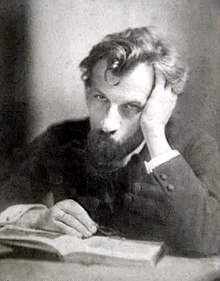| Palestrina | |
|---|---|
| Musikalische Legende (Opera) by Hans Pfitzner | |
 Pfitzner, by Wanda von Debschitz-Kunowski, ca 1910 | |
| Librettist | Hans Pfitzner |
| Language | German |
| Premiere | 12 June 1917 Prinzregententheater, Munich |
Palestrina is an opera by the German composer Hans Pfitzner, first performed in 1917. The composer referred to it as a Musikalische Legende (musical legend), and wrote the libretto himself, based on a legend about the Renaissance musician Giovanni Pierluigi da Palestrina, who saves the art of contrapuntal music (polyphony) for the Church in the sixteenth century through his composition of the Missa Papae Marcelli. The wider context is that of the European Reformation and the role of music in relation to it. The character of Cardinal Borromeo is depicted, and a General Congress of the Council of Trent is the centrepiece of act 2.
The conductor of the premiere was Bruno Walter. On 16 February 1962, the day before he died, Walter ended his last letter with: "Despite all the dark experiences of today I am still confident that Palestrina will remain. The work has all the elements of immortality".[1]
- ^ Liner notes to the Rafael Kubelik/Nicolai Gedda/Dietrich Fischer-Dieskau DG recording